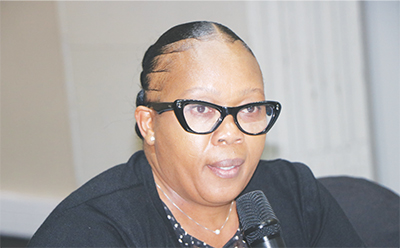By: Thoboloko Ntšonyane
MASERU – Advocate Tlotliso Polaki, the Ombudsman underscores that despite hurdles facing the Ombudsman’s office, the office makes headway.
This office is entrenched in the Constitution with a broad mandate and is clothed with legal powers under the Ombudsman Act No 9 of 1996.
The primary role of the Ombudsman is to receive and investigate complaints from individuals aggrieved by actions of government agencies, statutory corporations, officials, and employees, and to recommend appropriate remedial actions when complaints are found to be justified.
Advocate Polaki further highlights that the office serves as an alternative dispute resolution mechanism, mediating complaints involving mal-administration, corruption, human rights violations, and environmental degradation at no cost.
Since assuming office in June 2022, the office completed investigations in many individual cases. She however notes that, owing to non-compliance by some of the ministries on proposed remedial actions, these cases remain open until complied with.
As of March 31st, 2023, the office concludes 236 official complaints that could have been subjected to formal investigations.
Of concern to the Ombudsman, is also the fact that Polaki’s office’s reporting is unclear. The Ombudsman tells Informative Newspaper that she has a constitutional mandate to report “only” to parliament.
“There’s a need to observe and appreciate the wisdom behind its role as parliamentary watchdog with oversight powers over all government ministries, agencies and public officers.
“Ombudsman has to undertake her work without any fear, favor or prejudice…she also has to operate without any form of influence from any person whatsoever,” she stressed.
The Ombudsman’s office is also slated for the reforms. When those are completed, it will be called the Public Protector whose decisions will be deemed final binding and will be clothed with enforcement powers.
The non-compliance with her remedial actions, the Ombudsman pointed out that those impact on their performance as an institution.
Another lingering challenge the Ombudsman faces is that of lack of resources and underfunding of the office.
She says she devotes significant time and effort to enhancing the capacity and skills of the core staff at the office of the Ombudsman.
With the support of the European Union (EU), her office has been able to conduct a skills gap analysis which will inform a comprehensive training programme aimed at increasing the capacity of their investigative work.
The Ombudsman goes on to highlight the importance of joining hands with other like-minded entities adding that, they have concluded memoranda of understanding (MoUs) with institutions that include the Directorate on Corruption and Economic Offenses (DCEO), the Director of Public Prosecutions (DPP)’s office and the Auditor-General (AG).
Some of the notable cases the Ombudsman has carried out to completion include investigation at the Mohlomi Mental Facility, the torture of the inmates at Maseru Correctional Facility in December last year and the situation at the Queen ‘Mamohato Memorial Hospital.
Other investigations include that of the National University of Lesotho (NUL) students’ violent strike of June 2022 where one student lost his life.
“The Office has been conducting numerous outreach programmes to educate the public about our work and how they can lodge grievances with the office,” she says.


